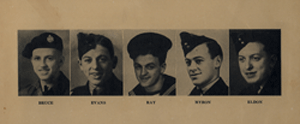Sobey Wall of Honour
Column
29
Row
4
As an eighteen-year-old army private, I arrived at the C.N.R. Station in Halifax, from Camp Borden, Ontario early one morning in October 1943. I was proud to join the military personnel aboard that train who marched from the train station to Pier 21 nearby. Over 700 enlisted men and women boarded the "Mauritania" bound for Liverpool, England, as reinforcements in the war against Hitler's Germany.
I returned home in December 1945 in the company of 75 officers and men. We left Liverpool on a converted ore carrier on the 12th. The ship had mechanical trouble this side of Ireland and had to return to Greenock, Scotland for repairs. After a terrible storm that followed us for the whole crossing, we finally made port. This crossing was filled with sickness and fear, but once we saw the warm and caring people inside Pier 21, the atmosphere changed.
The sights and sounds we encountered entering Halifax Harbour in the early morning on the 27th and landing at Pier 21, are still vivid. Pier 21 was a large warehouse with birds flying overhead in the rafters. It was a very noisy scene. We were not the only ship to arrive. Languages, other than English, were being spoken and I flashed back to streets in Europe. We were still wearing our Army uniforms, with great coats and full gear including our rifles.
Smells of mould, musk and body odours filled our nostrils but above the smells of the accumulated filth and dirt came smells of coffee. The local people were doing all they could to accommodate everyone. They had trays of egg and peanut butter sandwiches which said to us, "We're home!" They had wonderful cookies, cookies by the dozens - molasses, sugar, and date.
Sometime you couldn't hear your officer giving orders, but this didn't matter as we knew very soon we would be boarding the Canadian National Railway's trains headed for home. We were given our tickets. I was the only one to get off at Moncton, New Brunswick. The others traveled on to the provinces further west.
As we arrived at Pier 21, my mind wandered back a couple of years earlier to when two of my brothers would have entered this building ahead of me. One brother was in the Air Force and one was in the Army. My eldest brother, in the Air Force, flew out of Shearwater and on to Ottawa. He was a photographer up and down the East Coast during the war. My brother ahead of me was Navy, patrolling the waters of the East Coast and escorting ships from Halifax to Newfoundland. Eldon was in the Air Force and was a photographer. Myron was also Air Force and was sent to England. Evans was in the Army and served in England, North Africa, Italy and Sicily, and the Netherlands and Germany. I was in Holland on V.E. Day after I spent three months in the hospital in Belgium because I had lost the use of a leg due to nerve damage from an emergency operation for a ruptured appendix in a military hospital in Ontario.
From 1939 to 1943, five sons of Douglas H. and Gladys Atkinson of Moncton, N.B. joined the three services, fighting to keep Canada free. All five came home to work in Canada, the rest of their lives. Four are now deceased. I'm the fifth, and my name is Ronald "Bruce" Atkinson, a resident of Moncton, N.B. in the forties, now a long-time resident of Halifax, N.S.
